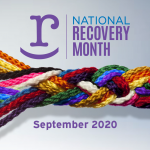The effects of Covid-19 have been difficult on us all, especially parents. Between home schooling, working from home and the everyday stress of a global pandemic, some days can feel insurmountable.
While this poses challenges for day-to-day parenting, it also presents an opportunity to connect with and to teach your children. Because kids are so adaptable, after these last six months they are already used to this “new normal.”
Sanctuary Centers has provided direct service since the start of the pandemic, and our therapists have advice for you on how to manage these increasing responsibilities.
Don’t Shy Away from Feelings
Kids and teens are exposed to our preventative measures from all angles—wearing masks and cancelled summer plans to remote learning this fall—so conversations about Covid-19 and its impact on daily life are important.
Be a role model and teach your children how to handle their emotions or difficult feelings by being open and honest. Show them how you’re adapting your life and be the example they need to see. Of course, these conversations need to be developmentally appropriate, depending on your children’s age:
- For children under 10: Don’t get too specific. Let them know there’s a sickness that’s affecting some people, but that doctors are working to cure it and mom and dad are keeping you safe too, which is why we’re not going to school right now.
- For adolescents and teenagers: You can share a little more with your older kids because they understand. They are exposed to more media, engage in social media and have larger social circles. As parents, it’s important to stay informed, have these conversations and share with them.
It will help your children, and you, to put a name to your feelings. For example, say: “I feel stressed out about the school year starting because I’m not a teacher and I also have to work from home.” Top it off by asking how they’re feeling. It will help your kids develop a vocabulary for their emotions. Don’t shy away from the difficult stuff—these conversations help normalize the emotions that can be part of everyday life. And the depth of children’s feelings is just as real as our own.

Set a Schedule
Just like during the school year, create a structured schedule for your kids and help them to settle into a predictable routine. Knowing what’s coming next is important for all of us in uncertain times, and consistency is key because it helps secure a sense of safety. Especially because they’re not going to school for at least a few more months.
Make a to-do list, these good habits can last a life time, and they can help you talk to your children about how to manage their time. These schedules can look different for every member of the family:
- For younger children: It can be as simple as saying, “Let’s go for a walk, then take a bubble bath, then wind down with thirty minutes of television before bed.” You’re also teaching them self-help and self-care, as well as coping mechanisms.
- For adolescents and teenagers: This age group tends to value their alone time. Give them some space and allow them to do activities they enjoy. Help them channel their emotions into productive habits like journaling, art or music. Though devices may alleviate some stress, it’s always a good idea to set some parameters around screen time.
- For siblings: Always be honest, but within a developmentally appropriate way. Share your frustrations with your brothers and sisters, and try to be patient. Come up with ideas for joint activities. Remember that they’re also trying to find ways to deal with this.
- For parents: In your couple, the best thing for you children’s long-term success is parental alignment: sharing similar messages, showing how you can work together and respect each other. While it’s hard to have a “date night,” it is possible to take some time for yourselves. It’s important for your kids to see how you as parents value your relationships and yourself!

Don’t Despair
Your days at the house can be fun! Put in the effort to make sure your kids see that! Change your relationship with your home! Make a game room or build forts. Create quiet zones and tiny sanctuaries where your kids won’t be bothered by their siblings or the routines of daily life.
Quarantine doesn’t have to make kids feel trapped—even though they can’t play with the neighbors anymore. Make a big deal about having family movie nights. Have a game night. Check YouTube (there’s even a Crafts for Kids channel) or Pinterest for fun and easy science experiments, or our previous blog articles: Coping with Covid Part I and Part II for inspiration.
These little moments of connection, of genuine engagement and family time can help us all not just survive but thrive… no matter how old we are.
If you, or your child, need some extra attention, don’t hesitate to reach out at 805-569-2785.
We are here for you.




